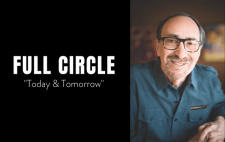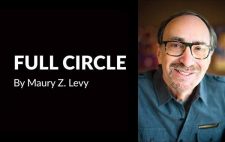I got a buzz, a brush, a flattop. Not because it was stylish. Taking it all off meant I didn’t have to get a haircut for months. And that saved money. We needed money.
A boy’s haircut was $1.25 then. My mother gave me $1.50. “Don’t forget to tip him,” she said. “I don’t want you spending that quarter on baseball cards or those stupid wax lips.”
She really didn’t trust me, my mother. One day, I’m sitting back in the big red barber’s chair, feeling like a king, when the phone rang.
“Barber shop, Carmen speaking. Yes, Mrs. Levy. Oh, I’ll tell him. Yes, ma’am.”
“Was that my Mrs. Levy?” I asked. At 10 years old, I was not yet married, so it was an easy guess.
“Yep, your mother wants me to remind you to not forget the tip.” He laughed. I turned as red as the chair.
My barber’s name was Carmen. In the state of Pennsylvania, it was a prerequisite that a barber be named Carmen.
“Are you here for your barber test?”
“Yes.”
“What’s your name?”
“Bill.”
“Sorry, you flunked.”
My favorite part of the haircut came at the end. Carmen would take a whisk brush and pour tons of talcum powder on it and then give my neck a good whisking. The talc was the closest I came to wearing cologne, like the older guys, the guys who dated girls. Other than my mother’s chocolate cake, there was no smell better than that.
In those days, barber shops played a major social function for both men and boys. It was where the men in the neighborhood met to talk – about sports, politics and, most of all, about their miserable lives at home.
Dominic was the oldest. A grizzled man with a big red nose and a belly that went to Bustleton Avenue, Dominic was the biggest complainer.
“You want to know what my wife made for dinner last night? Tuna fish. From a can. Can you believe that? I mean, a man works all day, he wants a hot meal when he comes home. A nice roast. Some chicken marinara. But no, I got tuna fish. From a can.”
“I‘ll tell you, Charlie, these women have it all today. Gas ovens with four burners. Washing machines. I mean, what else can a woman want? Now, what did you have for dinner?”
“Me?,” Charlie said, “I had beef stew.”
“Beef stew?! You’re a lucky man, Charlie. Hang on to that gal.”
Before cable news and Twitter, the barber shop was where men of the family showed off their political acumen.
“How ’bout that Joe McCarthy. He’s really stickin’ it to them Commies.”
“Yeah, I think they should all go back where they came from. We should make America ‘America’ again.”
I never joined in those discussions. I was a kid. And I was there for the magazines. There was “Argosy,” with great adventure stories about men with guns and girlfriends. And there was “Rogue,” a PG version of Playboy, where the girls were covered and the writing was bad. And then there was “Sport.” I read “Sport” cover to cover. There were stories there about athletes who didn’t live in Philly or South Jersey. Mickey Mantle, Frank Gifford, Oscar Robertson.
I decided, when I was 10 years old, that this was what I wanted to do. Interview sports guys and write stories about them. About 15 years later, that dream would come true. I would write for “Sport” magazine about Jimmy Connors and Bjorn Borg and Cris Evert. Oh, and some guy named Mike Schmidt.
When I was 10, I wanted my hair to look like those sports stars. I would look up at the sketches of the different styles. The crew, the flattop, the butch, the Hollywood, the college contour and the executive contour. There was so much to choose from.
But me? That was an easy decision. I was a buzz boy.












